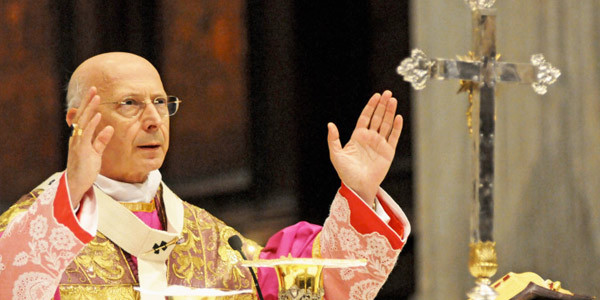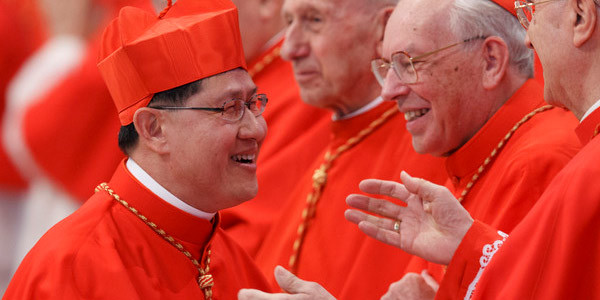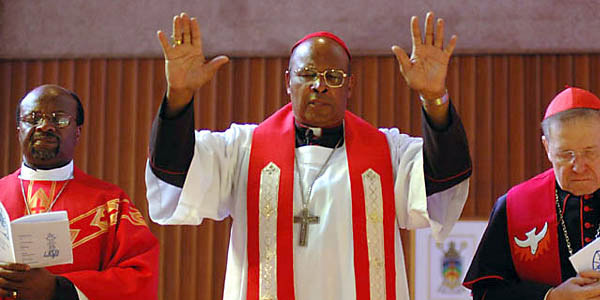Top of the Popes – One of These 25 Men Will Replace Benedict XVI
By Michael Kelly
Bagnasco is arguably one of the most-powerful Churchmen in Italy serving as president of the Italian bishops’ conference. This role has placed him at the coalface in the sometimes bitter debates between Church and State in Italy. He has become a popular figure in his homeland criticising political corruption and even denouncing former Prime Minister Silvio Berlusconi. The downside to all of this is, of course, that Bagnasco is little known outside of Italy. He has never worked abroad and is said to have little real understanding of the problems facing the global Church. He is seen as a staunch rival of Benedict’s right-hand man Cardinal Tarcisio Bertone. Many cardinals blame Bertone for some of the high-profile gaffes of Benedict’s Pontificate. 8. Cardinal Leonardo Sandri, Argentina (69) — 16/1 Sandri straddles two worlds: he is a native of Argentina, but born of an Italian family. His lack of pastoral experience is a real drawback. Ordained a priest in 1967, four years later he was drafted into the Vatican’s diplomatic service and has served the Roman Curia in this role ever since. He came to prominence in 2005 after becoming the man who read aloud Pope John Paul’s messages when the Pontiff lost the power to speak. His career took somewhat of a downward spiral under Benedict, and he is currently head of a somewhat obscure Vatican office that deals with eastern Catholic Churches. His ability as a diplomat is unquestionable, and he knows the ins-and-outs of the Roman Curia like no other. He remains largely unknown, however, to cardinals non-resident in Rome. 9. Cardinal Odilo Pedro Scherer, Brazil (63) — 25/1 Despite strong support for Cardinal Maradiaga as a Latin American candidate, Scherer is seen as being more favoured by European cardinals. He’s got plenty of Roman experience, having studied at the Gregorian University and later worked in the Congregation for Bishops in the Vatican. Within the Church in Brazil he is seen as a conservative voice. However, that may say more about the nature of the Church in Brazil. Overseas, he is seen as a moderate voice. In the event of no strong candidate emerging at the beginning, Scherer is a candidate that differing factions within the College of Cardinals could comfortably unite around. 10. Mario Bergoglio, Argentina (76) — 33/1 Bergoglio is a member of the Jesuit Order; he has won credit for his outspoken defence and advocacy for the poor of Argentina. Supporters say he is a man of deep humility and compassion who is willing to stand up to the authorities when he feels it is necessary. According to an unverified account by an unnamed cardinal, he got ten votes in the first ballot of the 2005 conclave that eventually elected Benedict XVI. He is a member of several of the powerful Vatican congregations and, consequently, will be well-known by his brother cardinals around the world. 11. Cardinal Gianfranco Ravasi, Italy (70) — 12/1 Considered more of an outsider, Ravasi represents a cultural wing in the Italian bloc frequently quoting from obscure northern European works of literature. Under Benedict’s direction, he has led a dialogue with the secular world and been at the forefront of the interface between Church and society in Europe. His relative inexperience (he has never run a diocese) would certainly count against him for more pastorally-minded cardinals. However, he is considered a skilled diplomat and a natural born communicator in the style of Pope John Paul II. He has urged priests to make their sermons more interesting and says he relishes the opportunity to help bring more young people back to the Church. If Europe emerges as a key consideration he has to be a contender. 12. Cardinal Francis Arinze, Nigeria (80) —25/1 Arinze seems destined to be the black Pope that never was. Nigerian by birth, he was brought to Rome in 1984 and made a cardinal a year later under John Paul II. His easy manner and keen administrative sense made him an obvious favourite as potentially the Church’s first black Pope. But 2005 came and went. Arinze turned 80 in November, and as such, is not allowed to enter the conclave or to vote. It doesn’t entirely exclude him from the change of being elected. However, for his brother cardinals it is likely to be a case of “out of sight, out of mind”. He is theologically conservative and has criticised a decision by the Church in the 1980s to permit altar girls. 13. Cardinal Timothy Dolan, USA (63) — 33/1 Dolan is known in Church circles to be pugnaciously orthodox defending the Church against its harshest critics. He has frequently complained against bias in the media. He has been seen as a Vatican enforcer and led investigations into Irish seminaries which are credited with tightening up the regime to ensure that future priests stick more closely to the Church’s traditional teaching. He is genuinely warm and regarded as down to earth, as comfortable drinking a beer at a barbecue as he is in the corridors of power in Rome. He is likely to be the victim of anti-American bias, with some cardinals complaining about his brash manner. That being said, if the cardinals opt for someone who will doggedly defend the Church to the death, they couldn’t have a better candidate. 14. Cardinal Luis Antonio Tagle, Philippines (55) — 20/1
At 55, Tagle is barely an adolescent when it comes to Church years. However, since joining the College of Cardinals late in 2012 he has impressed many. To say that his rise has been meteoric would be somewhat of an understatement. A bishop since the age of 44, he leads the Church in one of the most Catholic countries in the world. He is approachable with a permanent smile. He gained attention in Rome last year at a conference on clerical abuse when he spoke forthrightly about the need for the Church to handle the issue decisively. His youth would also bring vitality to the job in an age where every action of the Pope is scrutinised. If the cardinals decide to take a chance, he’s definitely in with a shout. 15. Cardinal Sean Patrick O’Malley, USA (68) — 40/1 O’Malley would be the first Pope in over 300 years to have a beard. He has had a mixed record as Archbishop of Boston; on the one hand he has steadied the ship following the devastating clerical abuse revelations that forced the resignation of his predecessor. At the same time, he has annoyed many Catholics by the fact that he has closed down parishes and Catholic schools to fund abuse payouts. He was part of Pope Benedict’s tea that came to Ireland and recommended that Irish Catholics adopt a more conservative and rigorous approach to their faith. He is a monk. The last monk to be elected Pope was Gregory XVI in 1831. He was ruthless, brutal and opposed gas lighting and railroads. As a result, the College of Cardinals tend to be a bit wary of monks. 16. Cardinal Dominik Duka, Czech Republic (69) Cardinal Duka is a hero of Catholicism in central and eastern Europe having spent time imprisoned for his faith under communist rule in the 1970s. He is a strong supporter of the ‘new evangelisation’ – the Church’s plan to breathe new life into the countries of ‘old Europe’ where the Faith is declining. He is not much spoken of in Rome, and, accordingly, not as well known among his colleagues as some other cardinals. Nevertheless, expect a strong push from eastern European prelates. He is a biblical scholar who ruffled a few feathers in Rome when he reported called the Latin Mass (loved by many conservative Catholics) “a Baroque artefact for Baroque times”. 17. Cardinal Giuseppe Betori, Italy (66) If the cardinals are tempted to go for a centrist who – at least in theory – can reach out to the various factions within the Catholic Church, Betori has form. He has tried to heal the historical divide between the progressive and conservative camps among Italian laity with various degrees of success. Betori has written in favour of the Church banning gay men from the priesthood and described abortion and euthanasia as the chief enemies of Christianity. However, despite his forthright views, he is accused by some in the Roman Curia of being hostile to Benedict XVI. Since Benedict has appointed many of the men who will elect his successor, this is sure to count against Betori. 18. Cardinal Donald Wuerl, USA (72) — 125/1 The Archbishop of Washington DC has survived in one of the most political cities in the world, that’s certainly a good training ground for Vatican City. Wuerl has impressed commentators all over the world for his willingness to confront the sexual abuse crisis. If this issue weighs heavily on the cardinals’ minds, Wuerl could emerge as a champion of transparency and accountability within the Church. His nationality will be a factor. Many cardinals are nervous about the prospects of electing a Pope from the world’s last remaining superpower. This could also have dire consequences for the relationship between China and the Vatican, one which Benedict XVI put a lot of energy in to resolving. 19. Cardinal Peter Erdo, Hungary (60) — 14/1 Cardinal Erdo has twice been elected the President of Europe’s bishops – this is a significant factor given that half the cardinals who will elect the next Pope are Europeans. He is considered a staunch traditionalist on doctrine, but good at building consensus among different groups within the Church. A formidable intellectual, Erdo’s critics say he lacks the personality and depth of vision to lead a global Church. However, his supporters point to the fact that he has worked hard to establish and deepen links between the Church in Europe and the Church in Africa. Given the fact that Africa is increasingly the powerhouse of the Church, this is a definite mark in his favour and means he may well pick up votes from Africa. 20. Cardinal Wilfried Napier, South Africa (71) — 100/1
A black South African, Napier is seen as strongly conservative on doctrine, while not being afraid to speak up when he thinks criticism of the Vatican is justified. He has criticised authorities in Rome for not being sufficiently sensitive to the cultural differences in African Catholicism. He is a keen Twitter enthusiast and just as likely to be debating religion on the social networking site as the latest moves in England’s Premier League. He has studied extensively abroad and is very well-known in Rome for his advocacy for social justice. His humble Franciscan spirituality is seen as appealing at a time when pomp and ceremony are making a comeback in some quarters in the Church. In 1988, he blocked a visit to South Africa by Pope John Paul II on the grounds that it would give legitimacy to the apartheid government. 21. Cardinal George Pell, Australia (71) — 50/1 Pell is a staunch conservative who combines doctrinal orthodoxy with a down-to-earth Australian sense-of-humour. He is a stout defender of the Church and has been to the fore in standing up for Benedict XVI against hostile attacks from some commentators. Pell serves on the Vatican’s committee that recommends new bishops and is seen as being responsible for pushing more conservative men to the fore. Even if he got off to a good start in the conclave, he is a divisive figure and would be extremely unlikely to attract votes from some of the more progressive camps within the College of Cardinals who see Pell as awkward and stubborn. He has been accused by Australian politicians of being a climate change denier. He has also ruffled some feathers by being an outspoken supporter of Australia becoming a Republic. 22. Cardinal Malcolm Ranjith, Sri Lanka (65) — 66/1 Hugely popular among the more traditional and conservative wing of the Church, Ranjith would allow the College of Cardinals to choose a man from the developing world with firm Roman credentials. Known for his personal holiness and administrative abilities, he is also a trained Vatican diplomat who has served in many cities around the world. He is a former senior official in the Vatican’s department responsible for the Church’s liturgy. He is also a former official in the Church’s department that manages the foreign missions overseeing a massive multimillion Euro budget. As such, he was responsible for sponsoring Church-related projects all over the world, winning his affection from many cardinals particularly in the developing world. 23. Cardinal Robert Sarah, Guinea (67) — 50/1 Sarah, known for his gentleness, has nonetheless shown himself to be a strong promoter of Pope Benedict’s vision for Church-run organisations. As President of the Vatican’s charitable arm, he has spearheaded a campaign for Catholic charities to be more explicitly Catholic in their outlook. He has encouraged Catholic organisations to end co-operation with groups that promote things like contraception that are contrary to Catholic teaching – this has won him wide respect within the Roman Curia. Well-known in Rome and in the developing world, he is little known in the rest of the Catholic world. 24. Cardinal Jaime Ortega, Cuba (76) 100/1 Ortega, the Archbishop of Havana since 1981, has come a long way from his humble background as the son of a sugar mill-worker. He has led the Church along a middle road with the communist authorities remaining cautiously defiant, while not wishing to bring ire upon the Catholic community. He is theologically conservative and has would be a man very much in the mould of Popes John Paul II and Benedict XVI, at least on religious questions. As is common for Latin American prelates, he is acutely aware of the limitations of free market capitalism. Anticipating a shift away from communism, he has urged Cubans not to construct a post-communist future on the basis of hyper-capitalist principles. 25. Archbishop Diarmuid Martin, Dublin (67) — 100/1 It’s almost 600 years since a Pope last retired – it’s more than 600 years since the College of Cardinals chose a Pope who was not a cardinal. If they go for that option this time, the no. 1 contender has to be the Archbishop of Dublin Diarmuid Martin. 67-year-old Martin has earned himself a distinguished reputation in the global Church for his handling of clerical sexual abuse. His forthright and no-nonsense approach has impressed many. However, some in Rome feel he has been too harsh in his criticism of other bishops. On the other hand, many think this approach is necessary. He is a former official of the Roman Curia and a Vatican diplomat and has travelled extensively gaining a valuable insight into the global Church. He is a shrewd administrator and a skilled political operator – qualities that enrage some while endearing Martin to others. If they opt for a non-cardinal, it’s hard to think of anyone else having a better chance.
|
.
Any original material on these pages is copyright © BishopAccountability.org 2004. Reproduce freely with attribution.


